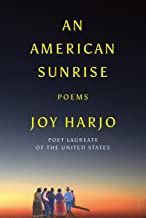An American Sunrise, Joy Harjo 2019
Ask 100 people on the street (yes, even in Harvard Square) who the U.S. Poet Laureate is and you might get a number of excellent guesses, but I doubt if more than one or two people will say, “Joy Harjo”. To be honest, I would have drawn a blank, perhaps naming the immediate past Poet Laureate, Tracy K. Smith who I heard speak last year when she received the Harvard Arts Medal. Harjo is a Native American, a member of the Muscogee/Creek nation living in Oklahoma, and despite being honored in the past with the Ruth Lilly Prize, the Jackson Poetry Prize, the William Carlos Williams Award, a Guggenheim Fellowship, and serving as a Chancellor of the Academy of American Poets, she has remained largely and sadly below the public’s poetry radar (if such a thing even exists!) until this year. Her appointment to a one year term as Poet Laureate was made by the Librarian of Congress and will hopefully begin to redress that situation.
The book combines her poems (described in a Boston Globe review as “moving like a prayer”) with brief quotations from members of her Muscogee/Creek nation and historical descriptions of the Trail of Tears, the forcible removal of Native Americans from their homes and traditional lands in the Southeast U.S. as a result of Andrew Jackson’s Indian Removal Act of 1930. Harjo’s grandfather fought this removal but ultimately complied, leaving his home in Alabama. In these prose vignettes as well as in her moving poetry, the loss of the peaceful, close-to-nature lives that the Indian tribes had before the arrival of the Europeans is made vividly real. Harjo frames the current immigration situation along our southern border as “Indigenous peoples who are making their way up from the Southern hemisphere are a continuation of the Trail of Tears.” One quote from James Scott, a Muskoke elder and survivor of the Trail of Tears resonated painfully for me: “After our walk, there were no babies left; they killed the babies.” This is a story that did not begin with our treatment of Native peoples nor did it end in the 19th C. The forcible eviction and violence towards minorities in the Holocaust, the Armenian genocide, the Rwandan genocide, and in the Yugoslavian War of only 20 years ago, all show that we have failed to learn our lessons and that the phrase ‘Never Again’ rings hollowly. Harjo specifically calls out Trump and his policies of violent treatment and exclusion of today’s immigrants, distinguishing herself as at least one person in Washington speaking truth to power.
Harjo’s book is a valuable reminder that America has unfinished business not just with the heritage of hate from slavery but in confronting our bloody and disgraceful history of our treatment of Native Americans. Despite or perhaps because of these horrors, the poetry in this book is beautiful and important to read, especially during this year of Harjo’s position as Poet Laureate.



